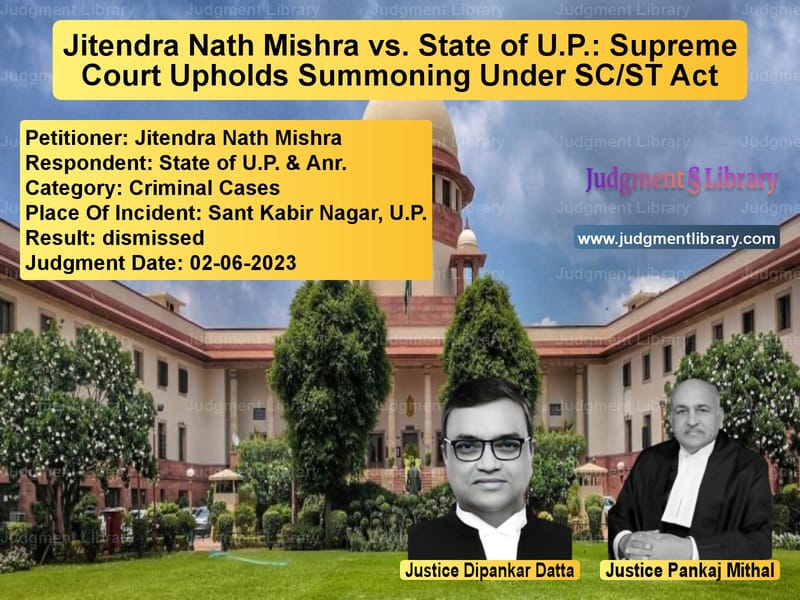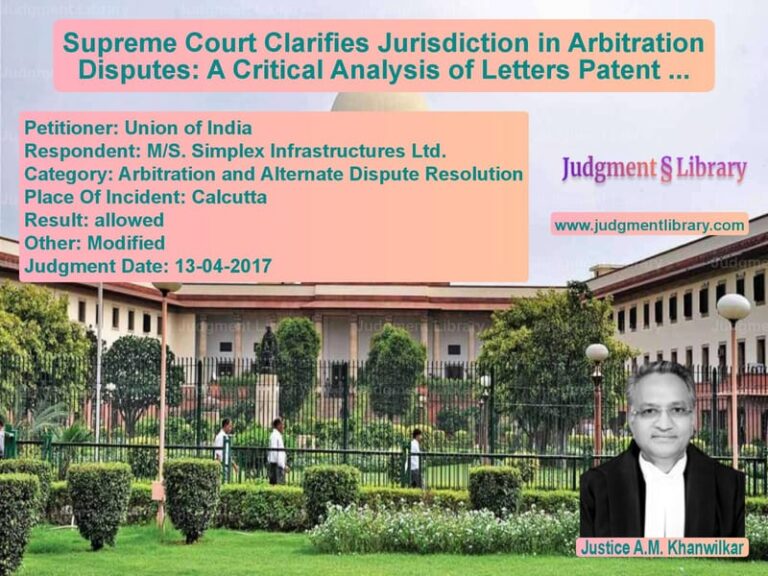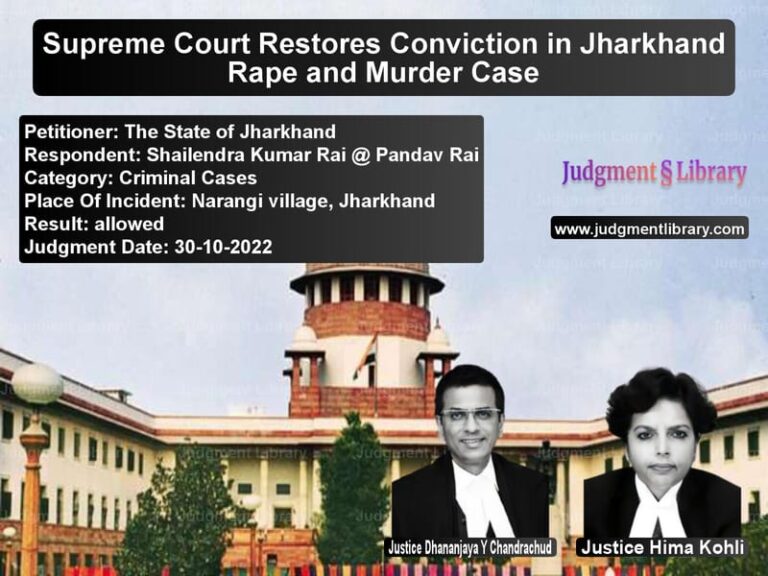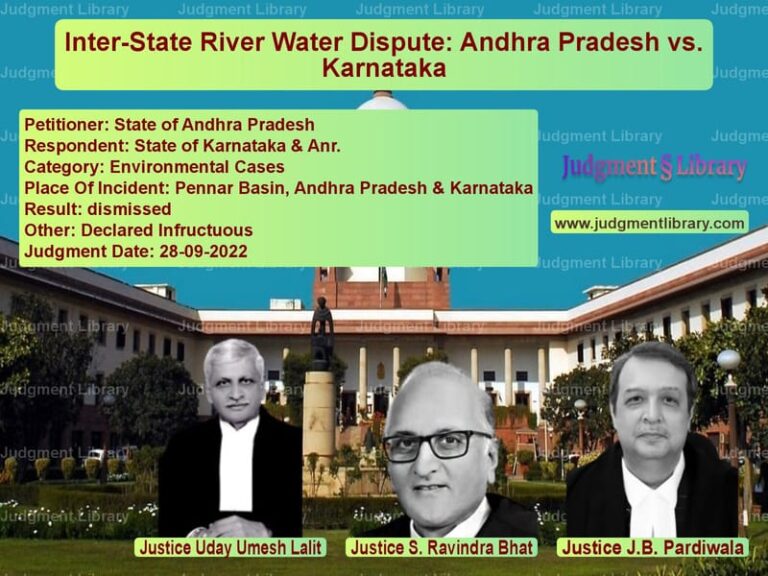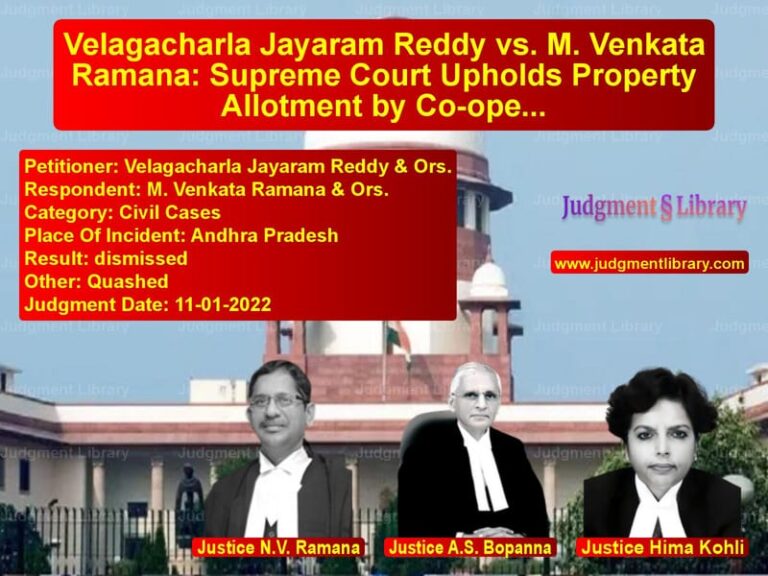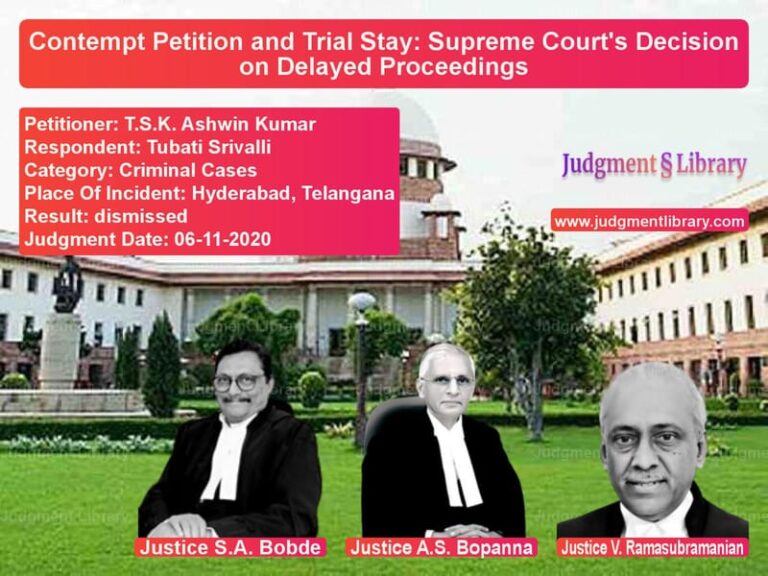Jitendra Nath Mishra vs. State of U.P.: Supreme Court Upholds Summoning Under SC/ST Act
The case of Jitendra Nath Mishra vs. State of U.P. revolves around the application of Section 319 of the Criminal Procedure Code (Cr. PC), which empowers a trial court to summon additional accused based on evidence presented during a trial. The Supreme Court’s judgment, delivered on June 2, 2023, upheld the decision of the Allahabad High Court and the Special Court under the Scheduled Castes and Scheduled Tribes (Prevention of Atrocities) Act, 1989 (SC/ST Act), which had summoned the appellant, Jitendra Nath Mishra, to face trial alongside the primary accused.
This case highlights the legal standards required for summoning an individual under Section 319, Cr. PC, and the evidentiary threshold necessary to include an accused at an advanced stage of the trial. The ruling reinforces that courts must exercise caution in summoning additional accused, ensuring that the evidence is sufficiently strong.
Background of the Case
The case originated from an FIR registered at Khalilabad Police Station, District Sant Kabir Nagar, alleging offenses under Sections 419, 420, 323, 406, and 506 of the Indian Penal Code (IPC), along with Sections 3(1)(r) & (s) of the SC/ST Act. The complainant alleged that:
Read also: https://judgmentlibrary.com/acquittal-in-maharashtra-murder-case-due-to-investigation-lapses/
- The primary accused, Dharmendra Nath Mishra, along with his brother (later identified as Jitendra Nath Mishra) and an unknown person, assaulted and abused the complainant and his wife.
- Despite naming Dharmendra in the FIR, the complainant initially only referred to “his brother” without specifying Jitendra Nath Mishra.
- The police investigation resulted in a charge sheet against Dharmendra alone, while Jitendra was not named.
- During the trial, the complainant and his wife testified that Jitendra Nath Mishra was also involved in the attack.
- Based on these depositions, the Special Court exercised its power under Section 319, Cr. PC, to summon Jitendra as an additional accused.
Challenging this order, Jitendra moved the Allahabad High Court, which dismissed his appeal. Subsequently, he approached the Supreme Court, seeking to quash the summoning order.
Key Legal Issues Considered
- Whether the evidence presented during the trial was sufficient to invoke Section 319, Cr. PC, and summon Jitendra Nath Mishra as an additional accused.
- The reliability of the complainant’s deposition, given that Jitendra was not explicitly named in the original FIR.
- Whether inconsistencies in witness testimonies weakened the case for summoning the appellant.
- The scope and limitations of a trial court’s power under Section 319, Cr. PC.
Supreme Court’s Analysis and Judgment
1. Applicability of Section 319, Cr. PC
Section 319, Cr. PC, allows a court to summon an individual not named in the charge sheet if, during trial, sufficient evidence emerges to justify their involvement in the crime. The Supreme Court cited the precedent set in Hardeep Singh vs. State of Punjab (2014) 3 SCC 92, which clarified that:
“The evidence must be such that it establishes more than a prima facie case against the person sought to be summoned but does not need to meet the standard of proof required for conviction.”
Applying this principle, the Court held that the testimonies of the complainant and his wife provided sufficient grounds to summon Jitendra Nath Mishra.
2. Delay in Lodging FIR and Naming the Accused
The appellant argued that the FIR was lodged almost five months after the alleged incident and that Jitendra’s name was not mentioned. The Supreme Court acknowledged the delay but ruled:
“A delay in lodging the FIR, though relevant, does not by itself negate the credibility of the prosecution’s case, particularly when the complainant consistently identified the accused in court.”
3. Inconsistencies in Witness Testimonies
Jitendra’s defense pointed out contradictions in the statements of the complainant and his wife regarding the mode of transport used by the accused. The complainant stated that the accused were in a car, while his wife claimed they were on motorcycles. The Supreme Court held that:
“Minor inconsistencies in witness testimonies are natural and do not necessarily discredit the core allegation, especially when the incident involved an assault under stressful circumstances.”
4. Lack of Independent Witnesses
The appellant contended that since the alleged assault occurred in a public place, the absence of independent witnesses weakened the case. The Court rejected this argument, stating:
“While independent corroboration strengthens a case, the lack of third-party witnesses does not automatically discredit the testimony of the complainant and his wife, particularly in cases of caste-based abuse.”
5. The High Court’s Decision
The Allahabad High Court had dismissed Jitendra’s appeal, ruling that the Special Court had exercised its power judiciously under Section 319, Cr. PC. The Supreme Court affirmed this view:
“The High Court correctly refrained from interfering, as the Special Court had sufficient grounds to summon the appellant based on the prosecution evidence.”
Final Ruling
- The Supreme Court upheld the summoning order against Jitendra Nath Mishra, dismissing his appeal.
- The ruling reinforced that trial courts have wide discretionary powers under Section 319, Cr. PC, provided the evidence justifies the summoning of an additional accused.
- The Court directed that Jitendra could contest his involvement during the trial but could not seek quashing of the summoning order based solely on procedural inconsistencies.
- The Special Court was encouraged to expedite the trial while ensuring fairness to both parties.
Implications of the Judgment
The ruling has significant implications for criminal law, particularly in cases involving:
- The standard of evidence required for summoning an additional accused under Section 319, Cr. PC.
- The impact of delayed FIRs and inconsistencies in witness testimonies.
- The importance of protecting victims of caste-based atrocities under the SC/ST Act.
- The role of appellate courts in reviewing trial court decisions regarding additional accused.
Conclusion
The Supreme Court’s decision in Jitendra Nath Mishra vs. State of U.P. reinforces the power of trial courts to summon additional accused based on trial evidence. It clarifies that while FIR delays and minor inconsistencies in witness statements may be relevant, they do not automatically invalidate prosecution claims. This judgment strengthens legal protections for victims under the SC/ST Act and ensures that individuals implicated through credible evidence can be made to face trial.
Petitioner Name: Jitendra Nath Mishra.Respondent Name: State of U.P. & Anr..Judgment By: Justice Dipankar Datta, Justice Pankaj Mithal.Place Of Incident: Sant Kabir Nagar, U.P..Judgment Date: 02-06-2023.
Don’t miss out on the full details! Download the complete judgment in PDF format below and gain valuable insights instantly!
Download Judgment: jitendra-nath-mishra-vs-state-of-u.p.-&-anr.-supreme-court-of-india-judgment-dated-02-06-2023.pdf
Directly Download Judgment: Directly download this Judgment
See all petitions in SC/ST Act Case
See all petitions in Bail and Anticipatory Bail
See all petitions in Judgment by Dipankar Datta
See all petitions in Judgment by Pankaj Mithal
See all petitions in dismissed
See all petitions in supreme court of India judgments June 2023
See all petitions in 2023 judgments
See all posts in Criminal Cases Category
See all allowed petitions in Criminal Cases Category
See all Dismissed petitions in Criminal Cases Category
See all partially allowed petitions in Criminal Cases Category

